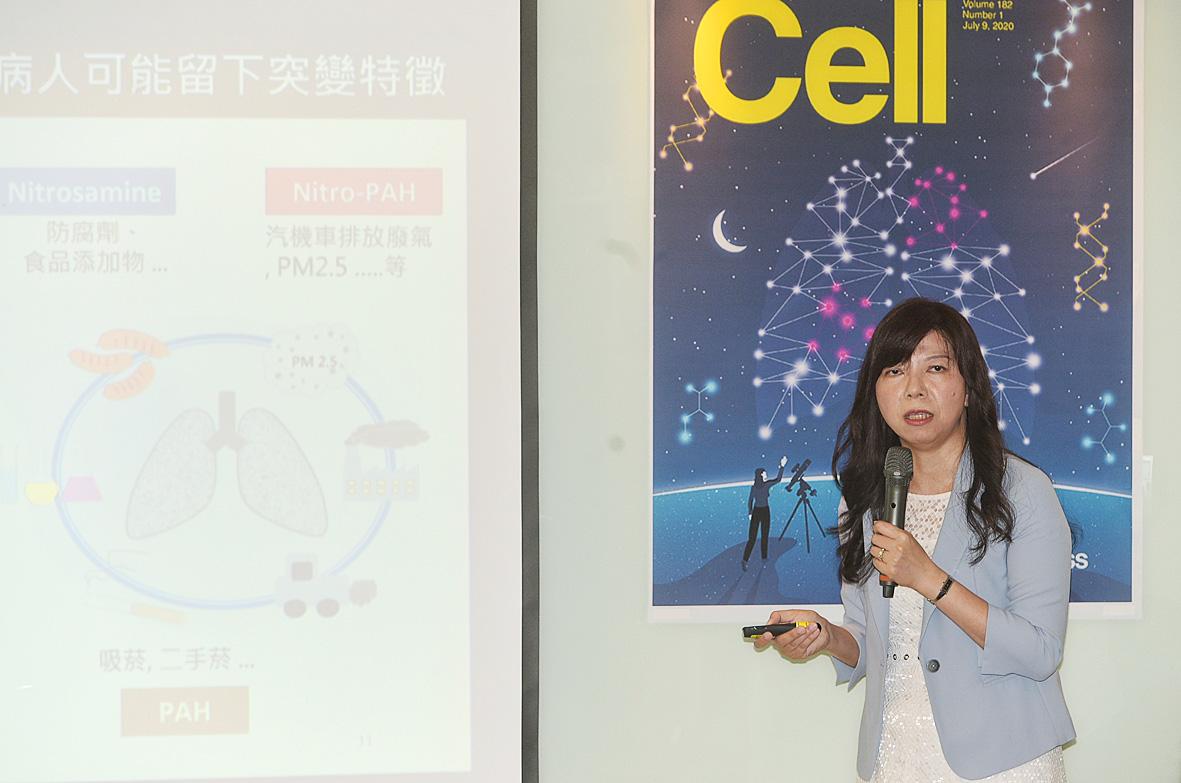A team of researchers yesterday unveiled the key genetic mutations of nonsmoking lung cancer patients, aiming to develop early diagnostic tools and precision medicine for the disease.
The study was a product of Taiwan’s participation in the US-led National Cancer Moonshot program since 2016, when Academia Sinica signed a memorandum of understanding with the US National Cancer Institute, Institute of Chemistry director Chen Yu-ju (陳玉如) told a news conference in Taipei.
While nearly 80 percent of lung adenocarcinoma patients in the US are chain smokers, more than half of the patients in Taiwan are nonsmokers, she said, adding that 93 percent of female patients do not smoke.

Photo: Chang Chia-ming, Taipei Times
It is a feature shared by many other East Asian countries, but the reason was unclear, she said, adding that the study was the first in East Asia to unravel the mystery.
Along with the US Clinical Proteomic Tumor Analysis Consortium, they studied tumor progression of patients in Taiwan and the US, she said.
Both studies were published in the journal Cell on Thursday last week and featured on its cover, showing an image of stargazers looking at a constellation that represents cancerous growth.
In Taiwan, up to 74 percent of female never-smokers (younger than 60 years old) showed higher mutation signatures of APOBEC — a family of proteins related to RNA editing, Chen said.
The team also identified a correlation between high APOBEC signatures and good responses to immunotherapy treatment, making APOBEC a potential biomarker for early diagnosis, she added.
Some environmental carcinogens might be drivers in early carcinogenesis, as indicated by the team’s findings about the metabolism and detoxification of carcinogens in females older than 70, Chen said.
Through the study, the team hopes to raise public awareness of the potential carcinogenesis of food additives, such as nitrosamine, which is used in fermented tofu and preserved radish, nitrated polycyclic aromatic hydrocarbons (nitro-PAHs) found in vehicle exhaust, cooking and secondhand smoke, as well as hereditary factors, Chen said.
As lung cancer symptoms mostly appear in late stages, most people have limited options other than immunotherapy and chemical therapy, which are costly, said National Taiwan University Hospital Division of Thoracic Surgery head Chen Jin-shing (陳晉興), who provided clinical samples for the study.
The study helps with the development of screening tools through blood testing, which would allow high-risk groups for lung cancer to avoid carcinogenic substances or behaviors, he said.
The study is the first phenomenal outcome of Taiwan’s Cancer Moonshot, with more expected to come, said former vice president Chen Chien-jen (陳建仁), now a distinguished research fellow at the institution’s Genomics Research Center.
However, the program has only received four years of funding, which is to end next year, Chen Yu-ru said.
The funding has shrunk annually, she added, while expressing the hope that the government would continue to support the program.

The manufacture of the remaining 28 M1A2T Abrams tanks Taiwan purchased from the US has recently been completed, and they are expected to be delivered within the next one to two months, a source said yesterday. The Ministry of National Defense is arranging cargo ships to transport the tanks to Taiwan as soon as possible, said the source, who is familiar with the matter. The estimated arrival time ranges from late this month to early next month, the source said. The 28 Abrams tanks make up the third and final batch of a total of 108 tanks, valued at about NT$40.5 billion

Travel agencies in Taiwan are working to secure alternative flights for travelers bound for New Zealand for the Lunar New Year holiday, as Air New Zealand workers are set to strike next week. The airline said that it has confirmed that the planned industrial action by its international wide-body cabin crew would go ahead on Thursday and Friday next week. While the Auckland-based carrier pledged to take reasonable measures to mitigate the impact of the workers’ strike, an Air New Zealand flight arriving at Taipei from Auckland on Thursday and another flight departing from Taipei for Auckland on Saturday would have to

A group from the Taiwanese Designers in Australia association yesterday represented Taiwan at the Midsumma Pride March in Melbourne. The march, held in the St. Kilda suburb, is the city’s largest LGBTQIA+ parade and the flagship event of the annual Midsumma Festival. It attracted more than 45,000 spectators who supported the 400 groups and 10,000 marchers that participated this year, the association said. Taiwanese Designers said they organized a team to march for Taiwan this year, joining politicians, government agencies, professionals and community organizations in showing support for LGBTQIA+ people and diverse communities. As the first country in Asia to legalize same-sex

MOTIVES QUESTIONED The PLA considers Xi’s policies toward Taiwan to be driven by personal considerations rather than military assessment, the Epoch Times reports Chinese President Xi Jinping’s (習近平) latest purge of the Chinese People’s Liberation Army (PLA) leadership might have been prompted by the military’s opposition to plans of invading Taiwan, the Epoch Times said. The Chinese military opposes waging war against Taiwan by a large consensus, putting it at odds with Xi’s vision, the Falun Gong-affiliated daily said in a report on Thursday, citing anonymous sources with insight into the PLA’s inner workings. The opposition is not the opinion of a few generals, but a widely shared view among the PLA cadre, the Epoch Times cited them as saying. “Chinese forces know full well that